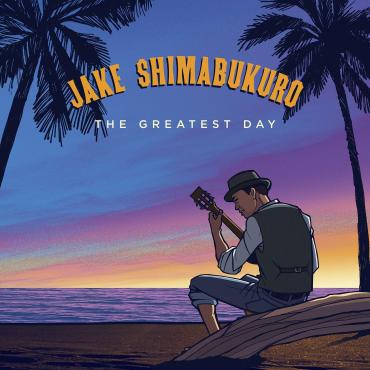Jake Shimabukuro Inhabits His Instrument

While Jake Shimabukuro has often been called the “Jimi Hendrix of the ukulele,” that’s a mistake: Shimabukuro exhibits more control, more diversity, more soul, more ingenious runs than Hendrix, who was more a technician than a guitarist. Shimabukuro never crowds the notes on his songs, and he plays with a soulful purity that preserves the sound of each note as it slides into another. He elicits emotion with his shimmering layers of sound, and he knows how to play just the right phrase to fill the measure. Shimabukuro’s genius is that he inhabits his instrument and every measure of his tunes while innovating within those spaces. His new album, The Greatest Day, illustrates Shimabukuro’s fidelity to a song and his ability to improvise within it to create a completely new sound. He’s joined on this album by Nolan Verner on bass, Evan Hutchings on drums, and Dave Preston on guitar, and the quartet creates stunning patterns of sound built around Shimabukuro’s sometimes fiery, sometimes gentle, chords and riffs.
“Pangram” opens with Shimabukuro’s rapid, fluid runs up and down the fretboard; the tune opens with a musical structure that resembles “The Flight of the Bumblebee,” and each instrument enters the musical conversation, building layer upon layer of sound with increasing complexity and beauty. In grammar, a pangram is a sentence that uses every letter of the alphabet at least once, and this tune runs through every note in the chord progressions of the song at least once. Shimabukuro and band take on Hendrix’s “If 6 Was 9” and turn it into a looping, jazz-rock journey that builds into a frenzy of repeated riffs and space-rock airiness. Shimabukuro turns his ukulele into a Stratocaster at intervals in the song, bending strings and running frets in a flurry of notes.
Jerry Douglas joins the band on Shimabukuro’s version of “Eleanor Rigby,” with Shimabukuro’s ukulele playing call-and-response to Douglas’ dobro. The title track features Shimabukuro leading the way with his cascading chords and guitarist Preston adding a spacious layer of riffs that carries the song floating into a jazzy stratosphere. Shimabukuro’s take on Leonard Cohen’s “Hallelujah” opens with a reverent, almost hushed, tone and proceeds slowly into the transcendental space the band creates; Shimabukuro treats the song like a hymn, and its beauty grows from that treatment. One of the three bonus tracks on the album is a live version of “While My Guitar Gently Weeps,” a longtime crowd favorite where Shimabukuro gets sounds from his ukulele that we never thought we’d hear from the instrument.
Shimabukuro is a musical genius at one with his instrument. The Greatest Day exhibits Shimabukuro’s dazzling musical dexterity, his canny arrangements, and his way of letting his feel for sound and structure direct him around musical corners and down unexplored musical paths.



